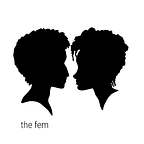Featured Fem | Meet Cameron G
Fem: As a writer, you mention that you have a passion for coming-of-age stories. Why do you think coming-of-age stories are important, particularly for young readers?
Cameron G: Coming-of-age stories give readers direct access to inserting themselves within the story. It best helps them to see themselves — especially if they are young and marginalized. In so many stories, readers are the bystanders of the story but the magic really happens when young readers can see themselves as the hero, no matter age or limitations.
F: You also write a lot about social justice issues. What advice you have for the writers out there looking to contribute to the discourse or better understand their privilege/oppression?
CG: I think the most important lesson is that unlearning oppression is a messy, long, and constant road. I’ve been involved in social justice for a few years now, and I’m still learning everyday. Mistakes happen — sometimes I’m still careless and my privilege goes unchecked. But I still do what I can to be conscious of where I need improvement and to remain transparent about that.
F: How do you define feminism for yourself personally?
CG: It’s so funny; I think my idea of feminism has shifted a bit. Before I saw feminism as this all-encompassing road to equality. But it’s a lot more layered than that. Feminism, to me, is really about finding a balance between the nuances and that are at opposite ends with each other within me, and working as best I can to be better. On an individual level, it’s a lot less intimidating that way, and I still think that greater equality is an admirable goal for mainstream feminism. But I think the emphasis should be more on individual responsibility; how can we all hold ourselves accountable to make small steps that make up larger change?
F: You’ve written both fiction and nonfiction. Are there differences in your approach to each of them? Do you find one to be more difficult to navigate than the other?
CG: I love fiction and nonfiction for totally different reasons — they’re almost like opposite ends of my soul. Fiction gives me the ability to let the limits of my imagination stretch; I can bend and explore different parts of myself and give them to other characters because I don’t necessarily want to limit or share these experiences with just myself. However, nonfiction lets me tell my personal truth. I’ve had experiences that have ranged from incredible happiness to deep sadness, but in nonfiction, I feel like I gain new ownership of that. Nonfiction helps me to fill that gap of “what if” and helps me over the hump of guilt or remorse; it can give me the closure I don’t always have.
F: What writers influence your stories?
CG: Oh, wow — this is always a hard one. I’m always inspired by incredibly intelligent writers and those that find that line between that intelligence, but also having it grounded in emotion. I look to writers like Octavia Butler, Toni Morrison, and Zora Neale Hurston for the foundation — my writing tends to have a Black feminist prejudice mainly because of these ladies (laughs). I’m also influenced by outside writers — Cheryl Strayed’s writing style has really inspired me lately, as well as reading work from Julia Alvarez, Chimamanda Ngozi Adiche, Tennessee Williams, and Sandra Cisneros. When it comes to influences, I’m a bit all over the place, but I’m drawn most to writers that are honest and authentic with telling the story of humanity.
F: Tell us a little bit about your upcoming novel!
CG: So this is something I’ve been a bit quiet about, but the more I work on it, the more excited I get. So I have a bunch of personal creative nonfiction essays that I’m working on that I’m hoping to turn into a novel. The tones range; if anyone has read my previous personal essays on spaces like Femsplain will probably be unsurprised. But the essays have common threads — they focus on my growth as a person, and hopefully others will be able to see the beauty in the imperfections of my experiences.
F: Has your writing helped your perspective on feminism to evolve?
CG: There’s a saying in feminist theory that the personal is political and that definitely rings true. My writing helps me to better understand and break down how I view things within feminism. It’s more than self-care, it’s a necessity for me to understand the constantly changing world around me. I also try to surround myself with feminist influences — there’s so many intelligent, dynamic influences out there that I constantly find myself learning from and rejuvenating my spirit to do better.
— — — — — —
Cameron is a twentysomething Black woman from New Jersey. A writer, activist and professional fangirl, she hopes to overthrow the patriarchy, one blog post and opinion piece at a time. You can find her at @WriterlyWay.
